Coinbase has taken an unconventional legal approach in anticipation of a potential crackdown by the U.S. Securities and Exchange Commission (SEC).
Prior to the SEC’s lawsuit against Coinbase on June 6, the company had submitted “amicus” briefs in two other crypto-related cases, offering its perspective as a friend of the court.
Amicus briefs, although common at the U.S. Supreme Court, are rarely filed in federal trial courts, accounting for just 0.1% of cases, as reported by law firm Gibson Dunn & Crutcher.
However, the crypto industry has seen an increasing number of amicus briefs in SEC cases, with industry groups supporting defendants.
Although a ruling in favor of another crypto defendant would not be legally binding for Coinbase, it could potentially strengthen the company’s defense.
By filing amicus briefs, Coinbase aims to influence legal discussions and steer them in a direction that aligns with its interests.
This strategy is about setting the groundwork for addressing legal issues that the amicus is concerned about. One of the cases in which Coinbase filed an amicus brief was represented by Gibson Dunn, the same law firm that represents Coinbase itself.
The SEC’s recent focus has shifted from targeting developers who sell unregistered digital tokens to larger players like exchanges, in an effort to regulate the cryptocurrency market.
Coinbase has become the SEC’s prime target in the United States. The regulator filed a lawsuit in Manhattan federal court, alleging that Coinbase operated as an unregistered exchange, broker, and clearinghouse.
The SEC claimed that at least 13 of the cryptocurrencies available on Coinbase, including Solana, Cardano, and Polygon, were securities.
Coinbase initiated its legal defense strategy last year when it became the subject of SEC investigation.
The company enlisted the services of prominent law firms Gibson Dunn and Cahill Gordon & Reindel to handle the two cases. In one instance, Coinbase supported the dismissal of an insider trading case involving a former Coinbase product manager.
The primary argument in Coinbase’s amicus brief, which could foreshadow its defense in its own case, is that the SEC lacks the authority to regulate digital assets that are not securities.
The SEC, on the other hand, maintains that the legal test used to determine securities depends on the economic realities of transactions rather than their labels.
The regulator urges judges to consider how digital assets are marketed and highlights promises made by crypto developers regarding potential profits.
Coinbase also argues in its brief that the SEC has failed to provide clear guidelines to cryptocurrency industry participants, violating their right to due process.
Coinbase’s other amicus brief was filed in support of Ripple Labs, a high-profile battle the SEC engaged in prior to the Coinbase case.
The SEC sued Ripple Labs in 2020, accusing the company and its executives of conducting an unregistered securities offering by selling the cryptocurrency XRP. Coinbase urged the judge to allow the fair notice defense in this case, claiming that denying it would impact future cases.
The outcome of these legal battles will have significant implications for the cryptocurrency industry.
It remains to be seen how the courts will interpret and apply existing regulations to the evolving world of digital assets. A ruling in the Ripple case is expected later this year.
Other Stories:
Melanion Capital Launches Bitcoin Equities ETF on Euronext Amsterdam Stock Exchange
FTX Files Lawsuit Seeking $700 Million from Former Associates and Affiliated Funds
Accenture Announces $3 Billion AI Investment After Wave of Layoffs










